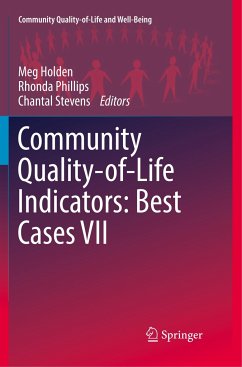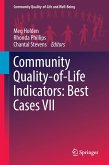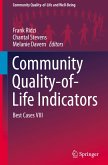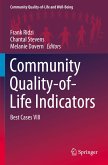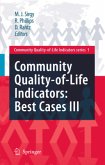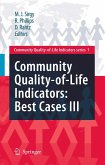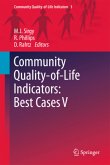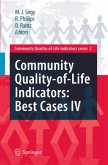Community Quality-of-Life Indicators: Best Cases VII
Herausgegeben:Holden, Meg; Phillips, Rhonda; Stevens, Chantal
Community Quality-of-Life Indicators: Best Cases VII
Herausgegeben:Holden, Meg; Phillips, Rhonda; Stevens, Chantal
- Broschiertes Buch
- Merkliste
- Auf die Merkliste
- Bewerten Bewerten
- Teilen
- Produkt teilen
- Produkterinnerung
- Produkterinnerung
This book is the seventh volume in a series covering best practices in community quality of life indicators. The case studies and analysis in this volume demonstrate how community indicators projects today operate within a need to amplify the voice of disadvantaged communities, seriously explore the increasing use of information technology, produce positive community change and sustain these efforts over time. The work presented here spans North American and Australian community work and demonstrates how the field of community indicators has undergone a rapid evolution in only a few decades.…mehr
Andere Kunden interessierten sich auch für
![Community Quality-of-Life Indicators: Best Cases VII Community Quality-of-Life Indicators: Best Cases VII]() Community Quality-of-Life Indicators: Best Cases VII38,99 €
Community Quality-of-Life Indicators: Best Cases VII38,99 €![Community Quality-of-Life Indicators Community Quality-of-Life Indicators]() Community Quality-of-Life Indicators75,99 €
Community Quality-of-Life Indicators75,99 €![Community Quality-of-Life Indicators Community Quality-of-Life Indicators]() Community Quality-of-Life Indicators62,99 €
Community Quality-of-Life Indicators62,99 €![Community Quality-of-Life Indicators: Best Cases III Community Quality-of-Life Indicators: Best Cases III]() Community Quality-of-Life Indicators: Best Cases III75,99 €
Community Quality-of-Life Indicators: Best Cases III75,99 €![Community Quality-Of-Life Indicators: Best Cases III Community Quality-Of-Life Indicators: Best Cases III]() M. Joseph Sirgy / Rhonda Phillips / D. Rahtz (ed.)Community Quality-Of-Life Indicators: Best Cases III121,99 €
M. Joseph Sirgy / Rhonda Phillips / D. Rahtz (ed.)Community Quality-Of-Life Indicators: Best Cases III121,99 €![Community Quality-of-Life Indicators: Best Cases V Community Quality-of-Life Indicators: Best Cases V]() Community Quality-of-Life Indicators: Best Cases V75,99 €
Community Quality-of-Life Indicators: Best Cases V75,99 €![Community Quality-of-Life Indicators: Best Cases IV Community Quality-of-Life Indicators: Best Cases IV]() Community Quality-of-Life Indicators: Best Cases IV75,99 €
Community Quality-of-Life Indicators: Best Cases IV75,99 €-
-
-
This book is the seventh volume in a series covering best practices in community quality of life indicators. The case studies and analysis in this volume demonstrate how community indicators projects today operate within a need to amplify the voice of disadvantaged communities, seriously explore the increasing use of information technology, produce positive community change and sustain these efforts over time. The work presented here spans North American and Australian community work and demonstrates how the field of community indicators has undergone a rapid evolution in only a few decades. Today as in their original formulations, community indicators projects are designed to gauge the social, economic and physical health and well-being of communities.
Produktdetails
- Produktdetails
- Community Quality-of-Life and Well-Being
- Verlag: Springer / Springer International Publishing / Springer, Berlin
- Artikelnr. des Verlages: 978-3-319-85437-3
- Softcover reprint of the original 1st ed. 2017
- Seitenzahl: 192
- Erscheinungstermin: 25. Juli 2018
- Englisch
- Abmessung: 235mm x 155mm x 11mm
- Gewicht: 301g
- ISBN-13: 9783319854373
- ISBN-10: 3319854372
- Artikelnr.: 53583274
- Herstellerkennzeichnung Die Herstellerinformationen sind derzeit nicht verfügbar.
- Community Quality-of-Life and Well-Being
- Verlag: Springer / Springer International Publishing / Springer, Berlin
- Artikelnr. des Verlages: 978-3-319-85437-3
- Softcover reprint of the original 1st ed. 2017
- Seitenzahl: 192
- Erscheinungstermin: 25. Juli 2018
- Englisch
- Abmessung: 235mm x 155mm x 11mm
- Gewicht: 301g
- ISBN-13: 9783319854373
- ISBN-10: 3319854372
- Artikelnr.: 53583274
- Herstellerkennzeichnung Die Herstellerinformationen sind derzeit nicht verfügbar.
Meg Holden (PhD, New School for Social Research) is a social scientist whose research investigates the promises and results of sustainability planning in cities around the world. She is an Associate Professor of urban studies and geography at Simon Fraser University in Vancouver, Canada. Meg served as a board member of the Community Indicators Consortium from 2011-2016 and she currently serves as editorial board member of the journal Applied Research in Quality of Life as well as the Springer book series on Community Quality of Life and Wellbeing. Meg is the author of Pragmatic Justifications for the Sustainable City: Acting in the common place (Routledge, 2017). Rhonda Phillips, Ph.D., FACIP, has research and outreach efforts that focus on quality of life and well-being related to community and economic development. At Purdue University, she serves as inaugural Dean of the Honors College and a professor in the Agricultural Economics Department. She is author or editorof over 20 books, including Sustainable Communities: Creating a Durable Local Economy, and Introduction to Community Development. Formerly a Senior Sustainability Scientist with the Wrigley Global Institute of Sustainability, Rhonda also served as director and professor in the School of Community Resources and Development at Arizona State University. She is a member of the College of Fellows of the American Institute of Certified Planners, and immediate past president of the International Society for Quality-of-Life Studies. Chantal Stevens is a Performance Management Analyst for the King County Auditor's Office where she also holds the position of Program Oversight Manager for the Countywide Community Forums, an innovative collaboration between the public and King County to improve public engagement. She previously served on the CIC board from 2004-2007, and again in 2012. Chantal was formerly the Executive Director of Sustainable Seattle, a pioneer inthe development of community indicators. She was the co- lead of the first conference dedicated to the exploration of CI-PM integration, and is currently an active advocate for community indicators and public engagement as a key element of a functioning performance management system at King County. She holds a BS and MMA from the University of Washington.
Preface; Rhonda Phillips, Meg Holden and Chantal Stevens.- Introduction; Chantal Stevens, Lyle Wray.- PART I. Community Indicators Identifying Different Types of Disadvantage.- Chapter 1. Environmental Justice in Australia: Measuring the Relationship between Industrial Odour Exposure and Community Disadvantage; Lucy Gunn, Billy Greenham, Melanie Davern, Suzanne Mavoa, Elizabeth Jean Taylor and Mark Bannister.- Chapter 2. Aligning Local and Regional Data to Achieve a More Inclusive Economy: A Northeast Ohio Model; Emily Garr Pacetti.- Chapter 3. Addressing Disparities and Improving the System of Care for Veterans Through the Community Assessment Process; Samantha Green, Melanie Espino.- Chapter 4. Economic Issues for Women in Texas; Jennifer Lee, Frances Deviney.- PART II. Comprehensiveness and Collaboration in Community Indicators.- Chapter 5. Comprehensive Sustainability Indicators: The Houston Sustainability Indicators Program; Lester King.- Chapter 6. Collaboration to Promote Use of Community Indicators: Communication is Key; Craig Helmstetter, Paul Mattessich, Ruth Hamberg and Nancy Harzler.- Chapter 7. Getting to Groundbreaking, But No Further: Network Failure in a Housing Indicators Collaborative; Meg Holden and Daniel Sturgeon.- Chapter 8. Community Indicators and the Collective Goods Criterion for Impact; Frank Ridzi.
Preface; Rhonda Phillips, Meg Holden and Chantal Stevens.- Introduction; Chantal Stevens, Lyle Wray.- PART I. Community Indicators Identifying Different Types of Disadvantage.- Chapter 1. Environmental Justice in Australia: Measuring the Relationship between Industrial Odour Exposure and Community Disadvantage; Lucy Gunn, Billy Greenham, Melanie Davern, Suzanne Mavoa, Elizabeth Jean Taylor and Mark Bannister.- Chapter 2. Aligning Local and Regional Data to Achieve a More Inclusive Economy: A Northeast Ohio Model; Emily Garr Pacetti.- Chapter 3. Addressing Disparities and Improving the System of Care for Veterans Through the Community Assessment Process; Samantha Green, Melanie Espino.- Chapter 4. Economic Issues for Women in Texas; Jennifer Lee, Frances Deviney.- PART II. Comprehensiveness and Collaboration in Community Indicators.- Chapter 5. Comprehensive Sustainability Indicators: The Houston Sustainability Indicators Program; Lester King.- Chapter 6. Collaboration to Promote Use of Community Indicators: Communication is Key; Craig Helmstetter, Paul Mattessich, Ruth Hamberg and Nancy Harzler.- Chapter 7. Getting to Groundbreaking, But No Further: Network Failure in a Housing Indicators Collaborative; Meg Holden and Daniel Sturgeon.- Chapter 8. Community Indicators and the Collective Goods Criterion for Impact; Frank Ridzi.

